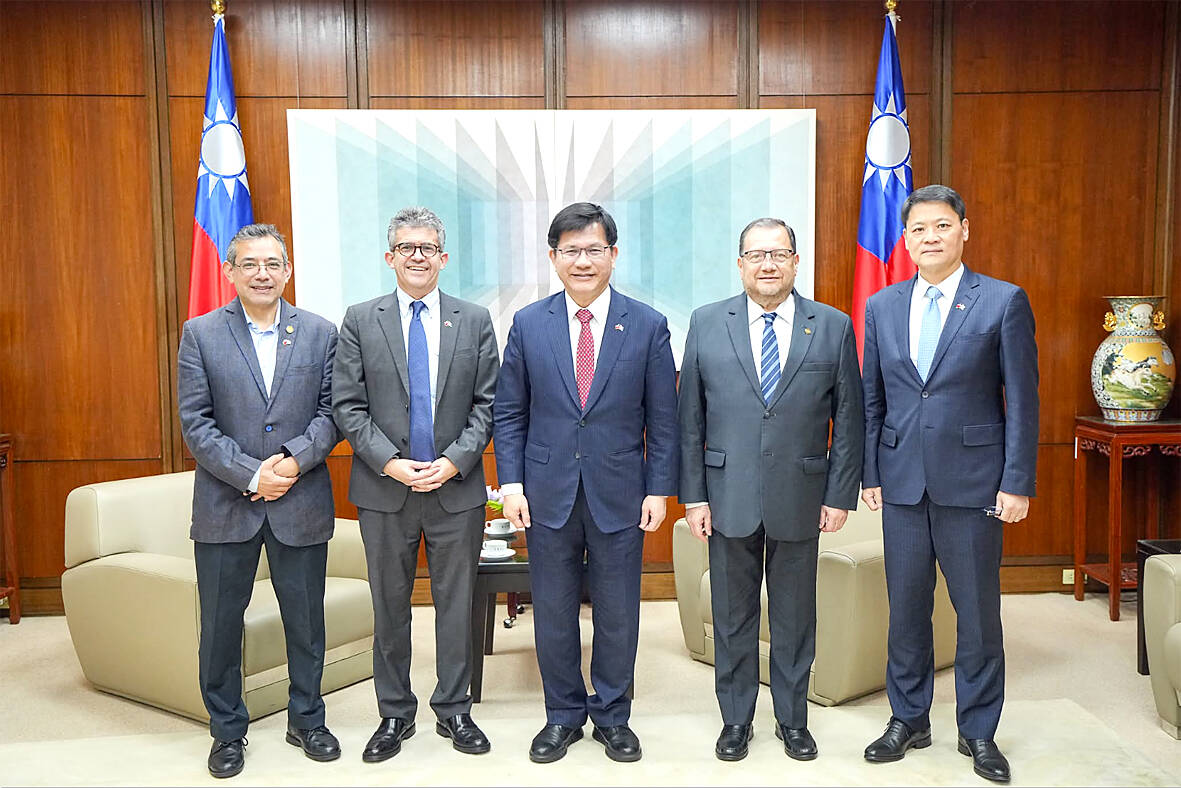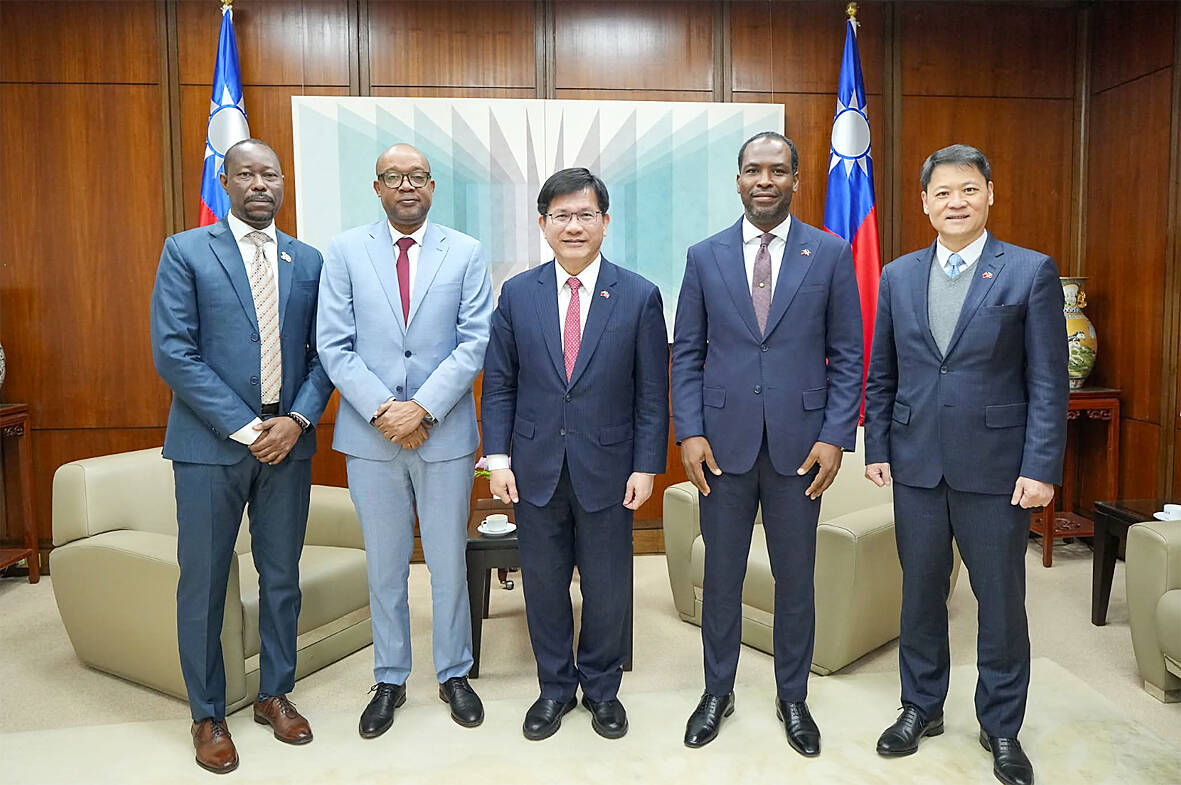Taiwan’s public health collaboration with foreign partners under the Diplomatic Allies Prosperity Project is essential to the cause of human rights, Minister of Foreign Affairs Lin Chia-lung (林佳龍) said yesterday.
Lin made the comments in a social media post following a meeting with Haitian Minister of Public Health and Population Bertrand Sinal and Guatemalan Minister of Public Health and Social Assistance Joaquin Barnoya in Taipei the previous day.
Cooperation in public health is a honed diplomatic instrument of Taiwan and one that President William Lai (賴清德) supports without reservation as a doctor, Lin said in the post.

Photo courtesy of the Ministry of Foreign Affairs
Sinal and Barnoya’s visit showed that all nations involved in the joint endeavor are committed to deepening the collaboration and improving the quality of medical care for the citizens they serve, he said.
Promoting growth in the healthcare industry to bring about comprehensive improvements in the quality and availability of care is one of the eight key sectors of the Diplomatic Allies Prosperity Project, Lin said.
Taiwan is providing aid to Haiti and Guatemala in the form of hospital construction, medical equipment, public health information systems, medical professionals and sustainable public health funding, he said.

Photo courtesy of the Ministry of Foreign Affairs
One concrete result was the establishment of an infant ward in the San Juan de Dios hospital with a capacity to care for 90 children, which Lin visited with Barnoya during a state visit to Guatemala, Lin said
Taiwan’s public health collaboration with its allies helps secure not only economic prosperity, but also uphold human dignity and the right to medical care, he said.
The ministry remains committed to facilitating Taiwan’s efforts to put its goodwill to work around the world, Lin said.
“Every child is an angel who deserves equal access to medical care regardless of race, color and creed,” he said.

ALIGNED THINKING: Taiwan and Japan have a mutual interest in trade, culture and engineering, and can work together for stability, Cho Jung-tai said Taiwan and Japan are two like-minded countries willing to work together to form a “safety barrier” in the Indo-Pacific region, Premier Cho Jung-tai (卓榮泰) yesterday said at the opening ceremony of the 35th Taiwan-Japan Modern Engineering and Technology Symposium in Taipei. Taiwan and Japan are close geographically and closer emotionally, he added. Citing the overflowing of a barrier lake in the Mataian River (馬太鞍溪) in September, Cho said the submersible water level sensors given by Japan during the disaster helped Taiwan monitor the lake’s water levels more accurately. Japan also provided a lot of vaccines early in the outbreak of the COVID-19 pandemic,

Kaohsiung Mayor Chen Chi-mai (陳其邁) on Monday announced light shows and themed traffic lights to welcome fans of South Korean pop group Twice to the port city. The group is to play Kaohsiung on Saturday as part of its “This Is For” world tour. It would be the group’s first performance in Taiwan since its debut 10 years ago. The all-female group consists of five South Koreans, three Japanese and Tainan’s Chou Tzu-yu (周子瑜), the first Taiwan-born and raised member of a South Korean girl group. To promote the group’s arrival, the city has been holding a series of events, including a pop-up

TEMPORAL/SPIRITUAL: Beijing’s claim that the next Buddhist leader must come from China is a heavy-handed political maneuver that will fall flat-faced, experts said China’s requirement that the Dalai Lama’s reincarnation to be born in China and approved by Beijing has drawn criticism, with experts at a forum in Taipei yesterday saying that if Beijing were to put forth its own Dalai Lama, the person would not be recognized by the Tibetan Buddhist community. The experts made a remarks at the two-day forum hosted by the Tibet Religious Foundation of His Holiness the Dalai Lama titled: “The Snow Land Forum: Finding Common Ground on Tibet.” China says it has the right to determine the Dalai Lama’s reincarnation, as it claims sovereignty over Tibet since ancient times,

Temperatures in some parts of Taiwan are expected to fall sharply to lows of 15°C later this week as seasonal northeasterly winds strengthen, the Central Weather Administration (CWA) said today. It is to be the strongest cold wave to affect northern Taiwan this autumn, while Chiayi County in the southwest and some parts of central Taiwan are likely to also see lower temperatures due to radiational cooling, which occurs under conditions of clear skies, light winds and dry weather, the CWA said. Across Taiwan, temperatures are to fall gradually this week, dropping to 15°C to 16°C in the early hours of Wednesday